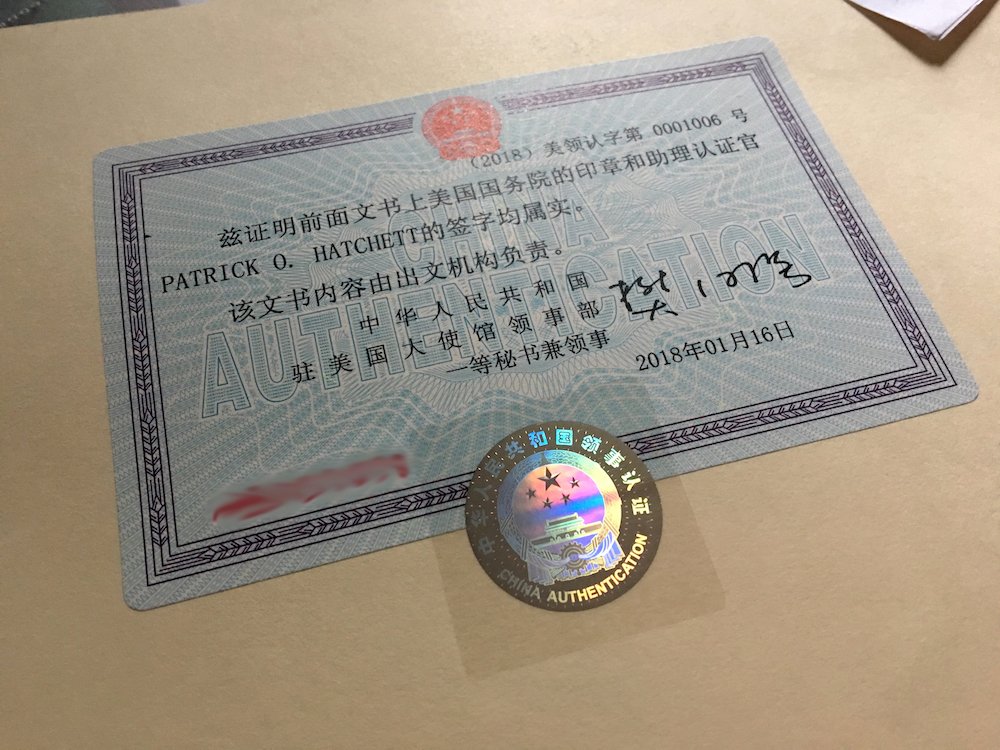The New China Work Visa Process
When I went to China for the first time back in 2013, the process to obtain my work visa was a huge bureaucratic pain in the ass. Now, it’s even worse. Let’s just say the Golden Age of anyone with a pulse slipping through the cracks and into your local expat bar is now over. I can’t restate this enough, if you do not have a degree, you are no longer welcome to work in China. Don’t even try it because it will end in disappointment. The new rules have slammed that door firmly shut.
That said, the process is fairly complicated, time-consuming, and expensive, and after having gone through it successfully myself, I almost feel duty-bound to outline it here. As a disclaimer, this is from an American point of view on acquiring a work visa for the TEFL industry, so your experience may vary. Buckle up and prepare the ibuprofen.
Step 1: Authenticate your documents for use in China.
After your school offers you the job, you’re off to the races. In this case, it’s a marathon rather than a sprint. The first and most time-consuming thing that you need to do is have your documents authenticated for use in China. This will include your degree, criminal record check, and possibly your TEFL certificate, depending on the policies of the province you will be living in. In most cases, a local criminal record check from a county courthouse will suffice.
What do I mean by “authenticated”? Well, technically the above documents are only recognized by the US government in their current form. The aim of this process is to make them legalized for use in China. For the majority of countries that are part of the Hague Convention, you need only make an apostille application to have your documents legalized for use in all member countries. China is not part of the Hague Convention, so welcome to hell.
“The first and most time-consuming thing that you need to do is have your documents authenticated for use in China.”
Step 1.1 - Get your documents notarized.
The authentication process follows this hierarchy: local, state, federal, embassy. So the first step is to have your documents notarized locally, which is not a big deal. However, you may have to request a degree copy from your university and have the registrar write a statement of acknowledgment before it gets to the notary. I did this because I didn’t want to ruin my original degree and because I didn’t want to risk doing any of this incorrectly. If your criminal record check is coming from the county courthouse, it does not need to be notarized because it is coming directly from the local government.
Step1.2 - Get your documents authenticated by your state’s Secretary of State.
Once you have everything notarized, you need to send the documents off to be authenticated by your state’s Secretary of State. Every state is different, but for North Carolina this involved filling out a short form, enclosing a check for the processing fee, along with my documents. In my case, I was able to include a couple of envelopes to have my documents forwarded onward to DC for the next step, and then back to my address when they were finished. I recommend you call your Secretary of State’s office directly and ask if they can do the same, as it will save you valuable time. This leg took about a week.
Step 1.3 - If you live in the DC jurisdiction, get your documents authenticated by the US Secretary of State.
Unfortunately, if you’re like me and live under the jurisdiction of the DC Chinese Embassy, you have an extra step. The documents now need to make yet another trip to the US Secretary of State’s office in DC. As I mentioned, I was able to have my documents forwarded along rather than waiting for them to get back from the state before sending them. From the time they received them to me getting them back, it took about 10 days.
Step 1.4 - Get your documents authenticated by the Chinese embassy.
The end of the first and longest step is in sight, but you’re about to spend some money. Your documents need that final approval from the Chinese embassy, and you cannot mail these in personally with the application as you did in the previous steps. You must show up to your embassy or consulate in person, or use an agent to submit the documents on your behalf. It is not cheap to hire an agent, but if you factor in gas, cost of a hotel, food, and time, it is much cheaper than going to DC on your own, unless you live there of course. I used China Visa Service Center (CVSC) for all interactions with the Chinese embassy and was very pleased with them. It took 12 days to send my documents and get them back.
Alternative Step 1 - Have your degree directly verified by the Chinese Ministry of Education.
Update 2/13/19: I’ve been made aware that you can have your degree authenticated by the Chinese Ministry of Education, which would cut out the middle man and potentially save a lot of time and money. A company called Shortcutz-China has reached out to me about this recently, and although I have not used them and cannot vouch for them, their representative told me that they can work directly with the MOE to get foreign degrees verified quickly. I could not find much more information than what was given to me in the email, so take it with a grain of salt. If you are interested in learning more about this alternate verification process, reach out to Shortcutz-China here. They are not a sponsor of the blog and I am including them here for your information only.
“Maybe 20% of potential teachers that I interviewed should have been granted a position to educate young children.”
Step 2 - Send your authenticated documents to your employer; await your work permit.
Now that you have your documents, probably with a lot of attachments now stapled on, you have to get them to your employer in China. This is either going to be really quick and easy or more money and more waiting depending on your situation. In my case, the local Foreign Affairs office in Daqing was happy to accept scans of my documents. I don’t know if this is an official policy or my boss just has a good relationship with them. The lines are always blurry on things like this.
There was some additional mercy here in that you are allowed to use a scanned copy of your work permit for the visa application, so once your boss acquires that you don’t need to wait for it to arrive all the way from China. It took about a week to get my copy of the permit.
Step 3 - Apply for your work visa.
Alright, after all of that time and money, you can finally apply for your visa! Get ready to spend more money! Let’s first have a quick look at what you’re going to need to prepare for your visa application packet:
Your passport (at least 2 blank pages)
Photocopy of your passport
Visa application form
Photograph (follow the strict guidelines)
Work permit
Application fee
There are a couple of additional things needed depending on what state you’re in, but this is what everyone will need to include while applying. Once again, I would advise you to use a visa agent like CVSC unless you live in a city that has a Chinese consulate or embassy. The quickest processing time will be around 6 or more days, but there are rush services available.
I understand why they’re doing this.
“The visa process isn’t cheap. Set aside at least a grand.”
Upon realizing all of the shit I was going to have to do to get this visa, my first response was anger. Oh, here they go again trying to make life more difficult for foreigners, as per usual. I still don’t think it’s an outlandish hypothesis that this is a continuation of closing off the “open China” we once briefly knew. However, I think this is also a natural change in policy for a nation that is getting more and more developed with each day and is now better able to be picky with the talent that it’s bringing in from overseas.
From that perspective, it is a good thing. Anyone who has spent time in China will have also experienced the garbage-laden talent pool that is the ESL industry there. When I was in management, I dealt with all sorts. Maybe 20% of potential teachers that I interviewed should have been granted a position to educate young children. Our school is in a smallish city, and couldn’t afford to be choosey during hiring season. It’s going to be even more difficult with these rules in place going forward, but I think the industry, and ultimately the children, will be much better off with a more selective visa process.
So, how much does it all cost?
A lot. I know this must be a big question for a lot of people reading this, so I have broken it all down below to help you get an approximation of just how much you're going to be dropping on your legal right to live and work in China.
Criminal record check in my county: $25
Degree copy from my university: $15
Notarizing 2 documents in NC: $10
State authentication for 2 documents: $20 + $7 shipping
Federal authentication for 2 documents: $16 + $7 shipping
Embassy authentication for 2 documents: $50
Agent fee for handling your embassy authentication (with shipping): $187
Passport photos for your visa application: $12
Chinese embassy visa application fee: $140
Agent fee for processing your application (with shipping): $128
Grand Total for a Chinese Work Visa: $617
Ouch. ◉
Written by Seth Barham


